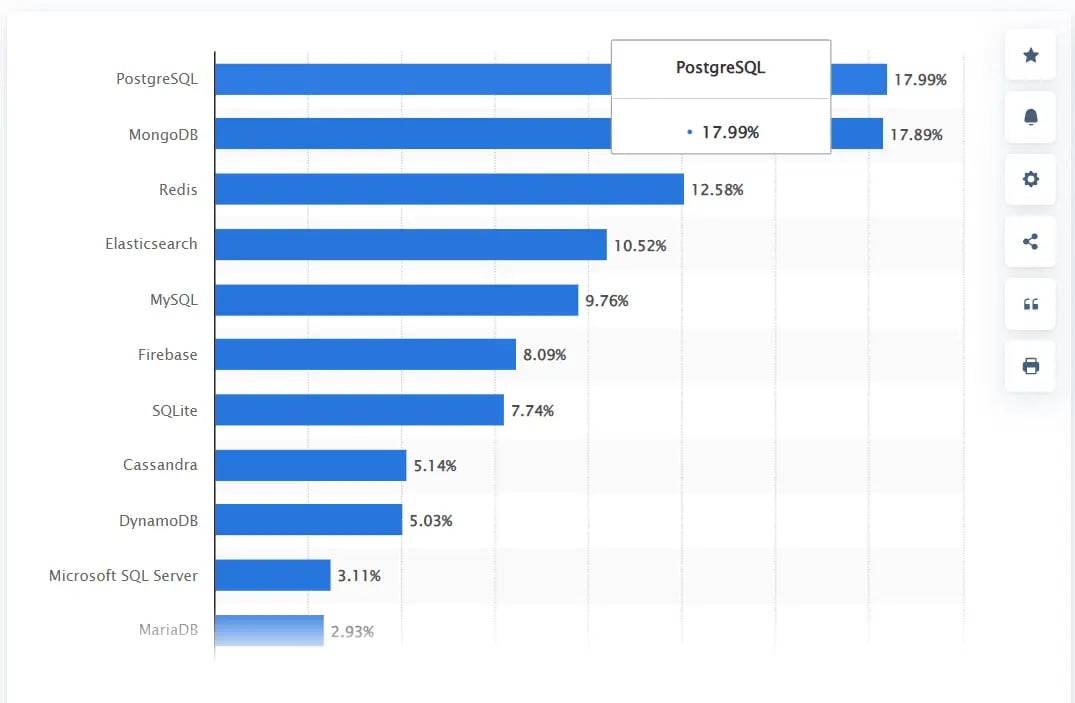We live in a world of applications! Yes, you read the right.
Try recalling that one app on your mobile phone that you cannot do without. There's more than one, right?
Well, we all can agree here!
However, maintaining and running a software application is not easy. It requires a great deal of effort to manage the database.
Simple database management skills are no longer sufficient in today's world. Who wouldn't want to hire an individual who can get information from the data you are maintaining and assist the company in better understanding its utilization?
When creating software applications, MongoDB allows you to manage data of all kinds in a scalable manner. To substantiate this claim, in a survey by Statistica, MongoDB came in second place, with 17.89% of participants saying that MongoDB is the most in-demand database technology amongst software developers.

(source)
But while hiring a MongoDB Developer, how can you ensure the MongoDB Developer is an expert in their industry? What kind of knowledge and abilities can we anticipate from them? What are the primary MongoDB Developer roles and responsibilities?
Let's find out!
What is MongoDB?
Simply put, MongoDB is an open-source document database. It is designed to hold enormous quantities of data. It cannot store or retrieve data in the form of tables, which is why it is characterized as a NoSQL database.
MongoDB document model has an absolute simplicity of workflow that no other NoSQL database provides.
Today, MongoDB is not only the first option of companies searching for a quick solution that is simple to grow in the future, such as Google, eBay, Paypal, Adobe, and many more, but it is also startup.
MongoDB's worldwide footprint has significantly grown. MongoDB Atlas has grown from its modest beginnings in only four AWS regions to operate in more than 95 locations across AWS, Google Cloud, and Azure.
What do MongoDB Developers do, and how do they benefit the organizations?
Every software application that developers and engineers build requires much time troubleshooting data.
In order to ease that process, MongoDB developers' roles and responsibilities incorporate building document models, which map data to objects in code.
MongoDB allows developers to streamline the data, plumbing, and complex processes, allowing them to focus on creating unique ideas and solutions that help their businesses stand out.
MongoDB developers utilize this technology to ensure that the database can be used from various programming languages, such as .NET, C++, Java, JavaScript, PHP, Python, Ruby, Rust, Scala, and Swift.
MongoDB developers benefit organizations by simply:
- Streamlining the distribution procedure
- Boosting innovation
- Assisting businesses to ship more quickly
- Enhancing the organization's capacity for storage and retrieval
|
Struggling to identify the right MongoDB talent for your organization? Try iMocha's AI-powered coding assessments |
MongoDB Developer Roles and Responsibilities
A. Designing MongoDB databases and data models
For the purpose of storing and retrieving structured data, documents, databases, and data models are made by MongoDB developers. Responsible for how the application depicts relationships between data is crucial to designing data models for MongoDB applications.
B. Developing and implementing MongoDB queries
MongoDB developers also create MongoDB queries by obtaining the necessary data from the database. They add criteria or conditions to a query operation in order to get particular data from the database.
C. Managing MongoDB infrastructure and ensuring high availability
Developers can maintain high availability for the MongoDB databases by using features like sharding and replication. If the system crashes or the hardware or software faces issues, developers implement replication processes in the databases. It helps them recover and back up the system.
D. Monitoring performance and optimizing query response times
It is done by utilizing a variety of techniques to monitor performance and optimize query response times. In order to monitor performance and optimize queries by identifying them, they isolate slow queries, set up indexing strategies to improve query performance, and more. Developers also use the MongoDB Compass GUI to visualize the query performance and adjust accordingly.
E. Ensuring data security and integrity
Another MongoDB developer role and responsibilities include ensuring data security and integrity. Developers in this job are in charge of making sure the data is correct and up to date, that it is stored securely, and that it is protected from unauthorized access.
F. Collaborating with cross-functional teams to identify and solve complex problems
MongoDB developers are required to coordinate with other members of the team to ensure that all designs are implemented correctly. Among other things, this might entail collaborating with other teams to guarantee that their applications are related to the database system and that their data is correctly maintained and stored.
G. Documenting database architecture and design decisions
Understanding the technical details and the business objectives and documenting the decisions made around the database architecture. They have to analyze the data access patterns, make decisions about the data model, schema design, and data partitioning, and write detailed documentation about the database design.
H. Mentoring and training other developers on MongoDB best practices
Apart from fulfilling the day-to-day job roles and responsibilities. MongoBD developers are also required to train their subordinates about the best ways of utilizing this tool.
|
Hiring time for niche roles skyrocketing? Use iMocha and create custom skills assessments to hire job-fit candidates and reduce time to hire by 50% |
MongoDB Developer Skills
Listed below is a list of the top technical and soft skills a MongoDB developer must have:
Technical Skills
- Linux systems knowledge
- Understanding of state-of-the-art MongoDB performance tuning capabilities
- Code versioning tools like Git, SVN, and Mercurial
- Azure, AWS, or any other cloud platform
- Big Data solutions like Hadoop
- DevOps automation tools
- Good grasp of MongoDB's aggregation framework
- Ability to configure schema and MongoDB data modeling
- Experience in Database security management
- Knowledge of MongoDB administration and installation in AWS and Red Hat
- In-depth understanding of MongoDB architecture
Soft Skills
- Strong analytical and problem-solving abilities
- Interpersonal skills to handle various critical situations
- Communications skills to handle critical circumstances well
- Collaboration and time management skills
Salary Expectations for MongoDB Developers
The average salary of a MongoDB Developer depends on various factors, such as:
- Location
- Individual's relevant work experience level
- Level of experience
However, presently MongoDB Developer, on average, earns about $38,548 in the US. If you want to know your local talent's salary requirements, look at the job market and examine what packages are offered for similar positions.
How can you find a MongoDB developer?
Finding a skilled MongoDB developer is a challenging task. Since it's currently the most in-demand technology, many individuals are working in this domain.
The best way to find a MongoDB developer is by determining what skills, experience, and qualifications are needed. Make a list of the necessary technical and soft skills and the expected responsibilities of the role.
Next, create a job description that accurately reflects the requirements of the role, the expected outcomes, and the company culture. Make sure to highlight the remote aspect of the job and any specific requirements related to working remotely.
Post the job-on-job boards, social media, and other platforms to reach potential candidates. Ensure to include the job description and other relevant details, such as compensation and benefits. You can also leverage various sourcing tools.
It is also considered that having a network of IT experts assists tech recruiters because many qualified applicants are passive job seekers.
|
Are you concerned that lengthy screening processes are impacting the candidate's experience? Check out how iMocha can help you reduce your hiring time by 40%! |
How to assess and evaluate MongoDB developers?
With a massive influx of resumes, deciding which is the most skill-fit candidate from the lot can be difficult.
Thus, you can conduct technical interviews with candidates that have passed the initial screening to evaluate their technical skills and expertise.
However, assessing MongoDB developers technical skills is a cumbersome task. It not only requires the interviewer to have sound knowledge of MongoDB developer roles and responsibilities but also the ability to assess their expertise and knowledge about the concepts.
That is why you should use skill assessments to identify their level of expertise in a data-driven manner.
You can expedite the hiring process by using platforms like iMocha. This AI-powered skills assessment application includes a large skill library of over 2500 skills to let you assess candidates' technical and soft skills in a single assessment.
This tool also allows you to tailor the assessment to your organization's specific needs. There are many other capabilities offered by this tool, such as:
|
It enables you to measure the programming skills of candidates at all levels. |
|
|
Live/Automated video interview functions |
To measure candidates' soft, technical, and communication abilities. |
|
You can remotely assess applicants on 25+ programming languages and 3000+ coding challenges using iMocha's live coding interview functionality. |
|
|
It helps to maintain the integrity of candidates during the assessment and offers reliable test results. |
|
|
Project-Based Assessments |
It enables hiring managers to assess candidates' skills in real-life project settings. |
|
Using this feature, candidates do not have to write lengthy codes from scratch manually. |
|
|
Detailed test analytics |
To evaluate your applicant pipeline, measure test performance, and examine invitation data. |
Additional features offered by the tools are:
- Customizable performance metrics
- Upskilling service
- University recruitment, lateral hiring, and diversity hiring services
- AI-EnglishPro to evaluate the English-level skills of candidates
|
Looking for a fair and secure testing environment? Leverage iMocha's AI-based proctoring suite, which is trusted by Deloitte, EY, Coupa, and more |
Wrap up
With the right skills and experience, a MongoDB developer can assist any firm in creating and maintaining a successful and secure database. MongoDB developer roles and responsibilities include database management and development, performance analysis, query implementation, testing, training, and support.
Make sure you choose valid & reliable online testing software with ready skill assessment tests to evaluate your MongoDB developers. You can try iMocha's MongoDB tests to assess your entry-level and junior MongoDB developers. It can help you weed out the irrelevant candidates with bluffed-up resumes and low technical skills.
Also here's a list of MongoDB Interview Questions to hire MongoDB Developers. Covering everything from basic to advanced questions to help assess technical expertise.
FAQs
1.What does a MongoDB developer do?
MongoDB developers design, develop, and troubleshoot applications that use the MongoDB database. They also write database queries, optimize database performance, and monitor the database for errors.
2.What are the required MongoDB developer skills?
MongoDB developers are required to have an array of technical skills, such as:
- Database Design and Development
- MongoDB Query Language (MQL)
- Data Modeling and Indexing
- Replication and Shading
- Backup and Recovery
- Performance Tuning
- Monitoring and Debugging
- Security and Authentication
Further Reading: Wondering how to hire tech talent? This guide is for you.

